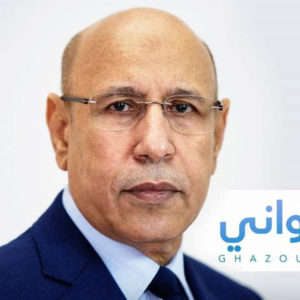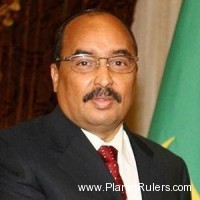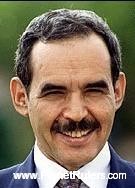Mohamed Ould Ghazouani, President of Mauritania (elected on Jun 22, 2019)
 Born 31 December 1956, also known as Ghazouani and Ould Ghazouani, is a Mauritanian retired general and politician who is the president-elect of Mauritania and will assume office on 2 August 2019.
Born 31 December 1956, also known as Ghazouani and Ould Ghazouani, is a Mauritanian retired general and politician who is the president-elect of Mauritania and will assume office on 2 August 2019.
He is a former General Director of National Security and former Chief of Staff of the Armed Forces of Mauritania (2008–2018). He was Defence Minister for Mauritania from October 2018 to March 2019. A close ally of Mohamed Ould Abdel Aziz, Ghazouani was elected as President of Mauritania on 22 June 2019 following the presidential election.
Ghazouani was born in Boumdeid, Assaba region on 31 December 1956. He belongs to a well-known Sufi family in Mauritania. Ghazouani is the son of a spiritual leader of the Maraboutique tribe Ideiboussat. He is married to a doctor, Mariam Mint Mohamed Vadhel Ould Dah. They have five children.
Source: https://en.wikipedia.org/wiki/Mohamed_Ould_Ghazouani
Mohamed Ould Abd AZIZ, Former President of Mauritania
 General Mohamed Ould Abdel Aziz (var. Muhammad Abdel-‘Aziz, Ould Abdelaziz, born 1956) is a Mauritanian military officer. He was a leading figure in the August 2005 coup that deposed President Maaouya Ould Sid’Ahmed Taya, and in August 2008 he led another coup that toppled President Sidi Ould Cheikh Abdallahi and Prime Minister Yahya Ould Ahmed El Waghef. Following the latter coup, Abdel Aziz became President of the High Council of State as part of what was described as a political transition leading to a new election.
General Mohamed Ould Abdel Aziz (var. Muhammad Abdel-‘Aziz, Ould Abdelaziz, born 1956) is a Mauritanian military officer. He was a leading figure in the August 2005 coup that deposed President Maaouya Ould Sid’Ahmed Taya, and in August 2008 he led another coup that toppled President Sidi Ould Cheikh Abdallahi and Prime Minister Yahya Ould Ahmed El Waghef. Following the latter coup, Abdel Aziz became President of the High Council of State as part of what was described as a political transition leading to a new election.
Born in 1956 at Akjoujt, Abdelaziz joined the armed forces in 1977 and attended the Royal Military Academy at Meknès in Morocco before rising through the ranks of the army. He set up the elite presidential guard unit known as the BASEP (Presidential Security Battalion). Abdelaziz was instrumental in putting down an attempted coup in June 2003 and a military insurrection in August 2004, for which he received the nation’s highest military award.
A military coup on 3 August 2005, led by Ely Ould Mohamed Vall, Director-General of the Sûreté National, and Colonel Abdel Aziz, who was commander of the Presidential Guard (BASEP), overthrew President Maaouya Ould Sid’Ahmed Taya. Colonel Abdel Aziz was said at the time to be one of the main actors in the actual carrying out of this coup. At the time, Abdel Aziz was described by a Western academic as a leader of a Mauritanian Nasserist group, pan-Arab secular nationalists. Western sources, citing Abdel Aziz’s background in coming from a traditionally favored Oulad Bou Sbaa Chorfa clan group, questioned the general’s commitment to democracy and reversing the history of ethnic and class inequities in the nation.
Contrary to this, the Mauritanian press credited Abdel Aziz for pushing to reduce military rule from 24 to 19 months and for attempting to limit voter fraud in the coming election.
Under President Sidi Ould Cheikh Abdallahi
On 30 August 2007, President Abdallahi named Abdel Aziz his Presidential Chief of Staff (Chef d’Etat-major particulier du Président de la République). Abdel Aziz, now a General, continued to work closely with the President: in the end of February 2008 he served as a personal envoy of the President to King Mohammed VI of Morocco. General Abdel Aziz was also commander of the forces sent to apprehend Salafist militants who had killed four French tourists at Aleg in December 2007.
A May 2008 article contrasted Abdel Aziz’s continuing involvement at the centre of political power with Ely Ould Mohamed Vall who had left public life. Abdel Aziz remained both advisor to the President and General, and was described as being at the nexus of “a small galaxy of other colonels, businessmen and politicians, in an uneasy balance.”
A conflict with the President was clearly growing by June 2008. At the end of June, the left-wing UFP party reported that they believed Abdel Aziz and Ould Elghazouani were planning for a coup, but were attempting a strategy of political change by hiving “independent” parliamentarians off from the government, which would replace the President peacefully.
A mass defection in the ranks of the ruling PNDD-ADIL party on 4 August 2008 (two days before the coup) with 25 Parliamentary deputies and 23 senators was reported to have been inspired by military leaders, and would have left the president unable to govern.
August 6 coup d’état
On the morning of 6 August 2008 Abdel Aziz was ordered removed by Abdallahi from his command, along with several senior officers including General Muhammad Ould Al-Ghazwani, General Philippe Swikri, and Brigadier General (Aqid) Ahmad Ould Bakri. The first announcement of the State Council was to annul this decree.
By 9:20 local time, BASEP troops seized the President, Prime Minister, and Interior Minister in the capital, Nouakchott. Mauritania television was taken off the air earlier, but Persian Gulf-based al-Arabiya television played an announcement said to be from the new junta. According to an official statement released on August 7, Abdallahi’s powers were terminated and Mauritania would be governed on a transitional basis by an 11-member High Council of State, with Abdel Aziz as the President of the Council, until a new presidential election was held “as soon as possible”.
Transition
Unlike the 2005 coup, public reaction to the 2008 coup by western governments in the days after 6 August were hostile, with a particularly harsh codemnation coming from former colonial power and past economic supporter France. In the two weeks following the coup, Abdel Aziz met with a number of foreign delegations, made personal phone calls to foreign leaders, and gave a number of press interviews to the international media. In these he stated that his actions were legal, a response to “anti-constitutional” oppression by the previous government, and that although “forced to take power” he had no desire for power. He did not rule out, though running in the promised elections. A Saudi-based newspaper has claimed that the General was motivated by a combination of disgust at the corruption of those close to Abdallahi, but also over legal threats against Abdel Aziz and others by the president regarding the behavior of the Mauritanian military during the mass expulsion of black Africans in 1989.
Abdel Aziz’s initial list of names for the High Council of State included five civilians, released on August 7, along with a statement that former government ministers could retain their jobs. By the end of the same day, this list had been revised, without public explanation, to include all military figures. Two small demonstrations were held on the day following the coup: one opposing the seizure of power, which was dispersed by the police with tear gas, and one march supporting the military, at which Abdel Aziz spoke. At that demonstration, marchers already carried life size photographs of Abdel Aziz in military uniform.
Within a week, a majority of the Mauritanian parliament voted to authorise the coup, and on the 13th, Abdel Aziz signed a “decree” appointing Moulaye Ould Mohamed Laghdaf Prime Minister of Mauritania. The Council stated that Abdel Aziz has the power to appoint the prime minister, military officials and civil servants in Maurtania.
Presidential elections
The coup government of General Ould Abdel Aziz promised that it would hold free and fair elections for President on 6 June 2009. On 5 February, Mauritanian state media reported that the General would stand as a candidate for president in these elections. Despite this attempt to legitimise the post coup government, the African Union carried out a sanctions regime first agreed on 22 December, and continues to recognise Sidi Ould Cheikh Abdallahi as the Mauritanian Head of State. General Ould Abdel Aziz headed a list of sanctions targets by the African Union which was put into effect on 6 February 2009. The sanctions against government and military officials who backed the August coup prevent travel to AU nations, the issuing of visas or travel documents to these individuals, and the seizure of bank assets within AU nations.
Maaouya OULD SID’AHMED TAYA, Former President of Mauritania
President OULD TAYA was born in Atar (Adrar Wilaya) in 1941.
After graduating from the Coranic School, the Franco-Arabic Primary school “Medersah” of Atar (1949-1955), and the high school of Rosso in southern Mauritania, he attended the French Military School in 1960 and graduated as an officer. In 1963, he joined the Military High Academy, and in 1975 went to the French War Academy for strategic training. After 1978, Mr. OULD TAYA was in charge of the Defense Ministry and Chief of Police in 1980. He became Chief of Staff of the Army in January 1981 and served as Prime Minister from April 1981 to March 1984.
He was designated again as head of the National Army in 1984 and a few months later, President of the Military National Salvation Army until his election as a head of state by popular vote.
Elections : The President was elected by popular vote for a six-year term on December 12, 1997 (next election will be held in November 2003).
Election results : President Maaouya Ould Sid’Ahmed TAYA was reelected with 90.9% of the vote in 1997. In 1992 he was elected with 63% of the vote.
President Maaouya Ould Sid’Ahmed TAYA was reelected on November 7, 2003 with over 66 % of the vote.
This election was held in perfect transparent conditions, as noticed by international observers.
The president’s goals for the years to come are to strenghthen friendly relationships with neighboring countries, fight radicalism and poverty, improve education among the population.


